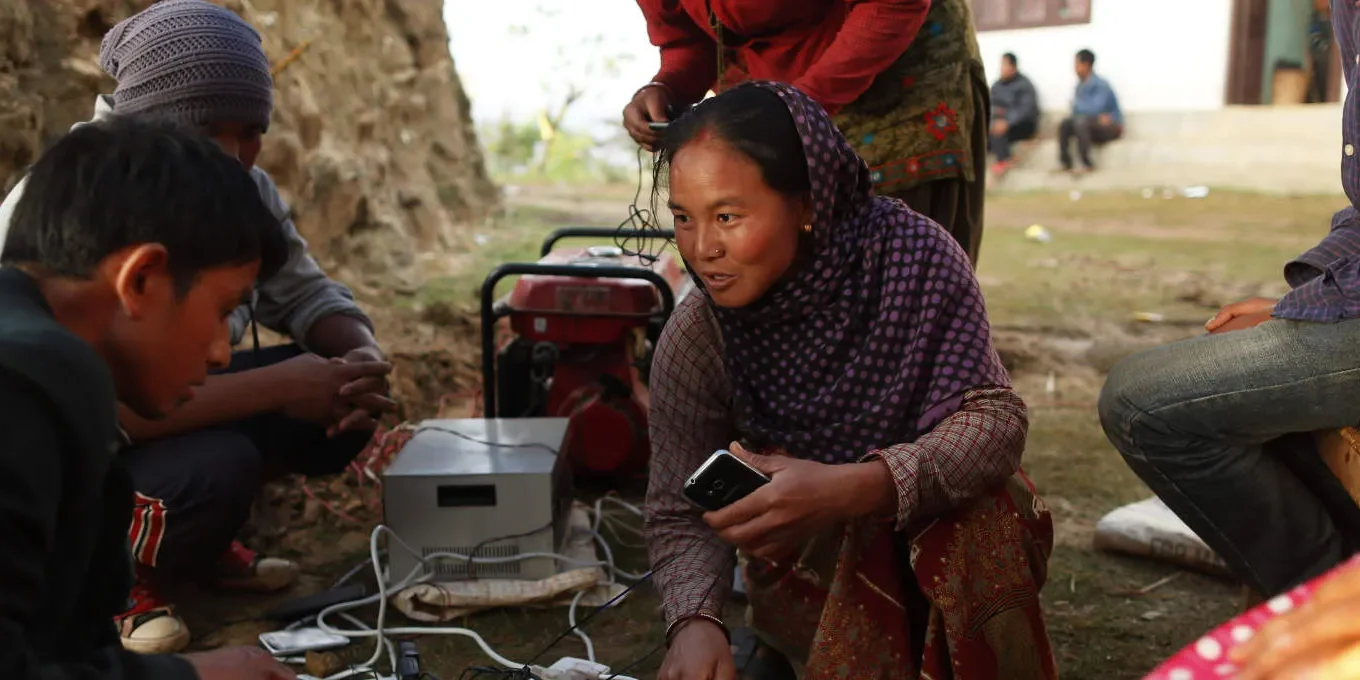Introduction
The Internet Society Foundation (the Foundation) is committed to supporting all organizations interested in applying for funding with resources to strengthen grant applications. We have put together this guidance to help you think about not only the details of your project but also the impact of your project. You will see there is an emphasis on monitoring, evaluation, and learning (MEL) in these trainings as well as a wide array of other topics.
While it’s likely that you – as an Internet Society Foundation Grant Applicant – have heard the words monitoring, evaluation, and learning (MEL) before, this guidance works to provide all applicants with a standard level of information about what MEL vocabulary and techniques mean in principle and practice, according to the Foundation.
The following monitoring, evaluation, and learning (MEL) modules are intended to support your grant application by providing guidance and best practices to strengthen your proposal and prepare you for setting indicators, tracking progress, gathering feedback, capturing successes, and reporting on your outcomes in projects funded by the Foundation.
Welcome from our Executive Director, Sarah Armstrong:
Disclaimer
Following this guidance does not, by any means, guarantee that you will be awarded funding. The intent of the modules is to provide resources in order to ensure that all applicants have a baseline set of resources to utilize good MEL practices to improve the chances of lasting impact in all of your areas of work, so we hope this guidance can be useful for you beyond your current grant application.
As well as the interactive, video based training modules that you can register for above, the same materials are available as HTML and PDF versions to suit your needs.
- a web-based text version (as shown in the pages below) for mobile, low-bandwidth connections and for those with accessibility needs
- a suite of PDFs for offline use and printing
Introduction of personas
To provide real-life examples to the sometimes-abstract-sounding concepts in this training, there are two personas that will serve as guides. Adam is a Grant Applicant from Sri Lanka who is interested in applying for Foundation funding for a specific project. Mariam is a Monitoring, Evaluation, and Learning (MEL) Expert that represents the Foundation.
 Adam the Grant Applicant from Sri Lanka
Adam the Grant Applicant from Sri Lanka
I am looking for funding for a project in Sri Lanka supporting women in technology. I want to apply for a grant with the Foundation. I want it to be successful. How do I build a strong proposal?
 Mariam the ISOC Foundation MEL Expert
Mariam the ISOC Foundation MEL Expert
The best way to build a strong grant application is to follow monitoring, evaluation, and learning (MEL) principles. It may seem like it takes a lot of work but thinking through the logic and design before you draft the details of the project (and thus your grant application) will vastly improve the end product. The Foundation strongly encourages taking this path and I’m here to guide you along the way.
These modules will introduce you to principles and tools of monitoring, evaluation, and learning (MEL.) If you work your way through them, you will have a stronger grant application, plus you will know how to increase the chances of lasting impact in your ongoing projects, too!
To get going, let’s start with the basics...
Guidance Modules
Why is Monitoring, Evaluation, and Learning (MEL) important?
To Measure Impact
Impact, as the Foundation defines it, is the positive influence of activities on the community the project is serving. Remember the overarching goal of the Foundation is to positively impact humanity through an open, globally connected, secure, and trustworthy Internet for all.
When designing a grant application, it is therefore important to be clear on what changes you envision (see “theory of change” section), and how you intend to measure whether your project is on the right track to achieve these changes. And remember: Impact can only be measured over time.
 Adam: “Impact can be anything that is a significant improvement on a social problem, right? Does my project have to have a specific kind of impact to be considered by the Foundation?"
Adam: “Impact can be anything that is a significant improvement on a social problem, right? Does my project have to have a specific kind of impact to be considered by the Foundation?"
 Mariam: "Yes, you’ve defined impact well. It really is all about making change – and in the case of the work you are doing with the Foundation – we want to see positive change. We want to see the investment in your community make a true difference. All Foundation Programme Funding Areas present opportunities to positively impact lives throughout the world. We are therefore expecting all of our grantees to be thinking about this regardless of what type of grant you are interested in: a Chapter or SIG Grant, funding for the Strengthening Communities / Improving Lives and Livelihoods (SCILLS), Research, Innovation or Disaster. More information on these programmes is shared below."
Mariam: "Yes, you’ve defined impact well. It really is all about making change – and in the case of the work you are doing with the Foundation – we want to see positive change. We want to see the investment in your community make a true difference. All Foundation Programme Funding Areas present opportunities to positively impact lives throughout the world. We are therefore expecting all of our grantees to be thinking about this regardless of what type of grant you are interested in: a Chapter or SIG Grant, funding for the Strengthening Communities / Improving Lives and Livelihoods (SCILLS), Research, Innovation or Disaster. More information on these programmes is shared below."
To Further The Foundation’s Vision
- The Internet Society Foundation was established to support the positive difference the Internet can make to people everywhere. Guided by our vision of an Internet for Everyone, the Foundation champions ideas and enables communities to unlock the Internet's potential to tackle the world’s evolving challenges. Focusing in five programme areas, the Foundation awards grants to Internet Society Chapters as well as non-profit organizations and individuals dedicated to providing meaningful access to an open, globally-connected, secure and trustworthy Internet for everyone.
To Contribute To The Foundation’s Programme Areas
The Foundation is deeply committed to our grantees, we provide funding to design Internet-powered impactful and sustainable solutions to challenges faced by communities worldwide. Grants are available to non-profit charitable organizations and individuals in five programme areas:
- Local and regional projects developed and implemented by the Internet Society’s Chapters and Special Interest Groups – Beyond the Net.
- Initiatives that Strengthen Communities / Improve Lives and Livelihoods (SCILLS)
- Opportunities for global research collaborations that advance understanding of the Internet and its value for all
- Initiatives that demonstrate innovative techniques with the goal of advancing an Internet for all
- Initiatives that help communities enhance preparedness and build Internet resiliency when faced with adverse events such as national disasters.

What does MEL mean to the Foundation?
Monitoring
Monitoring generally refers to the collection of results, information or analytics – what we refer to as data – about a particular initiative, event, or training to measure progress based on expectations (targets). Monitoring progress indicates whether your project is accomplishing its targets and helps you track trends and patterns. When you apply for a grant, it is important to show you have already considered how you will monitor the project, so the Foundation can see how likely you are to achieve your targets.
This guidance will include detailed information about how to set up a monitoring process for your project in the grant application phase as well as some helpful instructions for how to conduct monitoring throughout your project.
Monitoring answers “what happened?”
 Adam: "I’m planning a project that aims to enable more schoolgirls to start and succeed in careers in emerging internet technologies, such as the Internet of things (IoT). We’re planning some trainings so they have better skills and knowledge relevant to the sector. So, what does that mean for me?"
Adam: "I’m planning a project that aims to enable more schoolgirls to start and succeed in careers in emerging internet technologies, such as the Internet of things (IoT). We’re planning some trainings so they have better skills and knowledge relevant to the sector. So, what does that mean for me?"
 Mariam: "You need to be clear at the outset what success would look like in Key Performance Indicators (KPIs) and targets and how you would find evidence for it (data collection). Specifically, you need to find ways of measuring skills and knowledge, for example through questionnaires or by observing the students completing a task."
Mariam: "You need to be clear at the outset what success would look like in Key Performance Indicators (KPIs) and targets and how you would find evidence for it (data collection). Specifically, you need to find ways of measuring skills and knowledge, for example through questionnaires or by observing the students completing a task."
Evaluation
Evaluation is the process of making sense of your project data and using your monitoring to judge what is going well and what needs improvement. You can evaluate trends occurring over time and with certain topics. Evaluation provides helpful information first and foremost to you and your organization as well as to the Foundation, to further emphasize the importance of these types of projects and to more thoroughly understand and communicate the impact of the Foundation’s programmes worldwide.
Evaluation answers “what is significant about this?”
 Adam: "This is great. Yes, we think it’s very important to learn from our projects and deliver the highest possible impact. We’re just never sure how to do that – how would we evaluate our project training schoolgirls in Sri Lanka?"
Adam: "This is great. Yes, we think it’s very important to learn from our projects and deliver the highest possible impact. We’re just never sure how to do that – how would we evaluate our project training schoolgirls in Sri Lanka?"
 Mariam: "What is interesting to evaluate usually is whatever happened after your training was completed. I would recommend you do a mini workshop session with your team, where you look at questions like this:
Mariam: "What is interesting to evaluate usually is whatever happened after your training was completed. I would recommend you do a mini workshop session with your team, where you look at questions like this:
- Are there indications of changes (in knowledge, skills, awareness, behavior)?
- Are there any differences or similarities between different groups of training participants?
- What kind of further information or training did the participants request? What can you learn about the problem and your project design based on that?
- More generally, what have you observed (that is supported by data) about the impact of your training on communities and stakeholders you are working with?"

Learning
Based on your evaluation of the data collected, learning is the process to incorporate these findings to the project you are implementing and to better tailor your strategy to adapt to the needs of your partners and their communities. It can provide answers to the question – what can we change or do better based on the new information we have?
Learning asks “what can we do differently?”
 Adam: "After a training we ran last year for schoolgirls on the Internet of Things (IoT) trends, two girls asked us to review their CVs as they were applying for internships. They said our training had given them the confidence to take this step!"
Adam: "After a training we ran last year for schoolgirls on the Internet of Things (IoT) trends, two girls asked us to review their CVs as they were applying for internships. They said our training had given them the confidence to take this step!"
 Mariam: "That’s brilliant. How many girls participated in that training?"
Mariam: "That’s brilliant. How many girls participated in that training?"
 Adam: "About 40."
Adam: "About 40."
 Mariam: "What did the other 38 do?"
Mariam: "What did the other 38 do?"
 Adam: "They found it interesting but did not pursue that career path. One of them told me she was worried about the backlash she might receive as a girl in that sector."
Adam: "They found it interesting but did not pursue that career path. One of them told me she was worried about the backlash she might receive as a girl in that sector."
 Mariam: "Here are some useful learning questions:
Mariam: "Here are some useful learning questions:
- What was different about the participants who did achieve the desired outcome (apply for internship) in comparison to those who didn’t?
- What kinds of activities could we design for those girls who did not take the next step?
- Should we do activities with the parents, peers, or potential employers instead?"
Now that we’ve shared the introductory information to help you familiarize yourself with the purpose of this guidance and the monitoring, evaluation, and learning (MEL) definitions, it’s time to get to work and apply it to your programme. Throughout this course, you will learn techniques and practices to integrate monitoring, evaluation, and learning (MEL) principles into the programme you want to seek funding for. In order to get the most benefit from the guidance, we recommend that you follow the steps one-by-one, in the order that they are listed.
Note on Terminology
Throughout the training you will see yourselves – as applicants – referred to as ‘organization’ as a catch-all term for any grant applicant. We recognize that you may identify as one of the following terms: an individual, an Internet Society Chapter, a Special Interest Group, or an organization, etc. Any of those titles fit within the term ‘organization’ for the purpose of this training.

